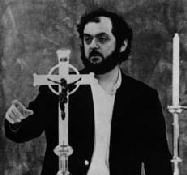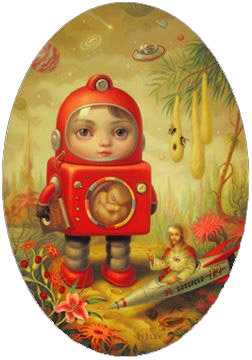A.I. Artificial Intelligence and Waking Life
For starters, both movies confound habitual assumptions about authorship and intentionality. For all its personal elements, is A.I. just a movie by Steven Spielberg, as so many reviewers have been insisting? It can be taken that way, but only at the cost of missing much of what's provocative and challenging about it. Similarly, one can see Waking Life as simply a Richard Linklater film only if one rules out Bob Sabiston, who designed the software program that made its animation possible, and the 30-odd artists who implemented the program.
I wouldn't call A.I. simply a posthumous work by Stanley Kubrick either, though I wouldn't rule out that dimension — which is clearly what motivated Kubrick's widow and brother-in-law to persuade Spielberg to take over the project and is part of what motivated Spielberg. Indeed, I suspect that Spielberg approached this project with more seriousness and more willingness to show fidelity to its source than he did when approaching the Holocaust or Oskar Schindler's life for Schindler's List. His limitations are still apparent in spots, but this film makes the usual distinctions between success and failure seem trivial. Pretty much the same holds for the dramatic construction, dialogue, and animation of Waking Life, because whenever any of these pieces falters, the film's conceptual strength — a sense of existential identity and place that exists beyond the parameters of "objective" photography, and the notion of animation itself as a kind of dreaming with profound links to our waking life — is still strong enough to carry them.
A.I. is about the ambiguous differences between human and nonhuman; Waking Life is about the ambiguous differences between real and imaginary. These are two sides of the same ontological issue, which I see as the primary issue for both technology and the media, including film. Despite the misanthropy of A.I. (which I associate with Spielberg as much as Kubrick, regarding 1941 and Barry Lyndon as two sides of the same coin), the film made me cry. And despite the ingenuousness of many of the bull sessions in Waking Life (which I tended at times to regard as musical accompaniment), the movie made me think. As a whole, audiences appeared to have an easier time with the innovations of Waking Life. In contrast, legions of viewers felt comfortable only with the middle section of A.I., wished the film had ended with the Blue Fairy, and preferred the pat ironies of Gigolo Joe (Jude Law) to the confusing emotions aroused by the lead mecha (a superb Haley Joel Osment); they seemed to be hankering for the sort of Spielberg film they already knew. Anyone who found this one merely sentimental wasn't paying close enough attention to the bleak and bitter undertones.
At the Savannah film festival I was fascinated to see some of Waking Life's initial live-action DV footage on Sabiston's laptop, and I hope that samples of this material will be included on the film's DVD. A.I.'s DVD is slated to be released in April, and I'm sorry it apparently won't include any of the 90-page Ian Watson script written for Kubrick that served as Spielberg's main source — though it reportedly will include a few of the 600 drawings by Chris Baker that Kubrick also commissioned.
|




